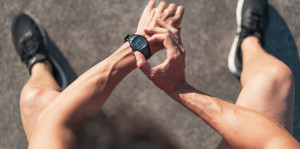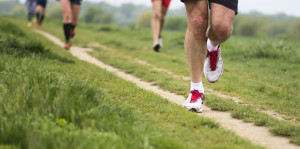Running legend Paula Radcliffe won the London Marathon three times in the early 2000s. She also holds the women’s world record time of 2hrs 15mins 25secs which she set at the 2003 London Marathon.
Here she explains how technology is helping every runner to become faster, and why she expects to see her record broken one day soon.
Which technologies do you think will improve running in the coming years?
Shoe technologies are continually evolving and finding better ways to cushion and protect the body from the impact. Shoes like the Nike 4% give this protection while at the same time giving a greater energy return.
In terms of digital technology, for a long time the GPS-type feedback on things like speed and pace has been improving and growing. I see no reason why that won’t become even more reliable and give people much more accurate information to work with in training.
And when it comes to race day, the tracking ability of things like the TCS app, where spectators can track runners through the race, has been growing and growing. The app is now handling a much greater volume of people using it, and much more information is coming through in the updates you get.
This has an obvious benefit for friends and family to be able to cheer the runners on. Ten to 15 years ago you used to have to predict beforehand and pick a spot, and if you missed them it was unlikely you would see them again before the end of the race. But now you can keep track of those runners you are supporting.
Have you noticed a rise in the number of runners using technology to improve their performance?
While there used to be a bit of resistance to technology, with some preferring a focus on how your body feels, now you see more and more runners of all levels using technology.
Devices giving more accurate information about the pace and speed that you are running at, help to make training much more technical and exact. They help you get better results, because you’re making sure the training you are doing is achieving what it is designed to achieve.
You can go into the race much better prepared in terms of the training you have done, and in terms of knowing which pace your body is fit enough to go out at. Being able to stick to that in the early stages makes it much easier to make sure you finish the marathon strongly.
And in the same way you can choose running to get from it whatever you want – it might be for weight loss, it might be to run faster, it might be to perform as an elite - you can also tailor your technology to support you in that area.
For example, elite runners probably won’t be that focused on the amount of calories that they are burning, but somebody running for weight loss absolutely would.
Then you have people who are unsure about running in case they get lost and having that GPS facility is a big boost for them. There are also technologies [like smart watches] that allow you to run without your phone, but you can still make a phone call. That helps reassure a lot of people worried about their safety when they’re running.
What forms of tech are favoured among professional athletes?
On race day you are not allowed to run with any technological assistance – you’re only allowed to know the time that you have been running for, as it is given out to you on the course.
But in the preparation for an event like the London Marathon, a huge amount of tech is now involved. Speed, distance, GPS, and heart rate data are all tracked and analysed. The athletes then go into laboratories to do physiological testing. Tech in the labs provides a lot of feedback to help the athletes see where their training is at, which areas can be worked on, where they can improve.
Technology around fuelling your run is also growing all the time. There is even tech involved in developing recovery techniques. You see a lot of people now using their own recovery equipment instead of having to go for a massage.
How has technology changed from the tech you used to support your training regimes and improve your race-day performance during your distinguished career?
It is light-years improved really. I would have some physiological testing in the laboratory, but then largely my training would be determined by using a heart rate monitor – that was probably about as technological as it got back then.
Toward the end of my career there were more reliable technological watches that started to come in where you could get more accurate feedback on metrics like distance and speed, and I’d use those.
But for the majority of my career they weren’t properly available and not as reliable as they are today.
What would you consider to be the most important technological breakthrough for long-distance runners during your career?
In terms of training it is probably that ability to track accurately and get the information feedback quickly and accurately.
In terms of racing I would probably say the improvement is in the technology of the equipment i.e. running shoes, where for distance runners on the elite side, the improvements are actually greater than for recreational runners.
Do you think those advantages could one day be enough for someone to break your London Marathon record?
Yes, I think that’s the nature of the sport. With all the technological improvements performances are always improving. For the elite athletes, while it’s never easy to run a marathon, it becomes easier over time to get closer to world record times. That’s the nature of all sports really, technology is improving performances all the time.
I had an advantage over the people 15 years before me, and that will keep happening.
Technology is becoming more prominent in sport, but it is presumably never going to be as important as raw determination and talent?
No. Absolutely not. At the end of the day it’s about physically running 26.2 miles. The hard work has to be done on every level.
Technology just provides a bit more support in doing that hard work, and delivers some improvement in performance. But the athletes still have to go out and do the training.
Tata Consultancy Services is the Official Technology Partner for the Virgin Money London Marathon 2018, and developer of the event’s official app.

